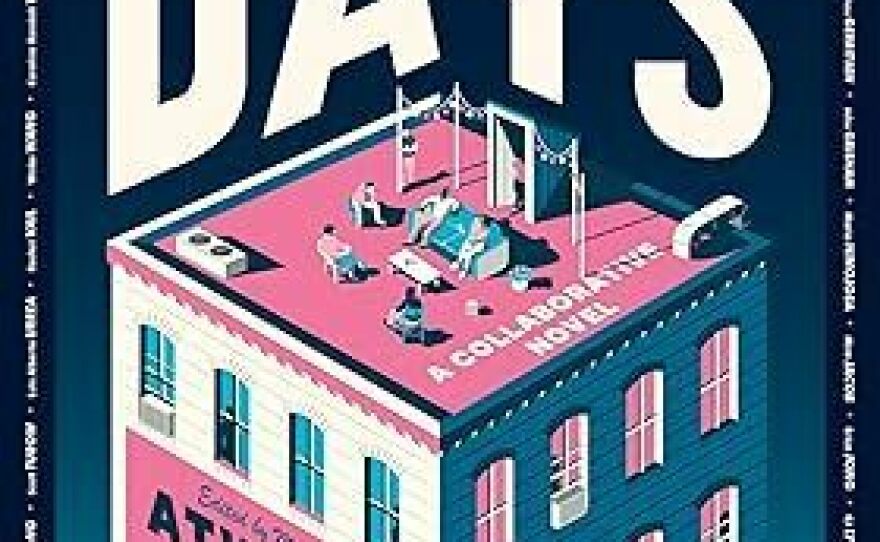Almost as soon as we'd all gotten "used" to the COVID-19 pandemic — which is to say, when we realized it wouldn't be as short-lived an event as we'd wished — I was one of many who noticed, at least online, an ambient yet frantic need to be productive. People were baking, growing plants, starting new crafting projects and, of course, writing.
Shakespeare, I kept seeing people proclaim, wrote King Lear during the 1592 plague outbreak in London; the implication being "that if the Bard managed to write a masterpiece during a pandemic, you had best have something to show for yourself before this quarantine is over — and it had better be more impressive than baking sourdough bread!"
It is a professor nicknamed Prospero who utters these ironic remarks in Fourteen Days: A Collaborative Novel, shortly after gently correcting the popular meme about Willie S. that was spreading like (forgive me) the plague during March and April of 2020. In fact, Prospero tells his neighbors on the roof of 2 Rivington St. in New York City's Lower East Side, Shakespeare wrote Lear in "the plague-free summer and autumn of 1605."
Fourteen Days, which is an Authors Guild project and was edited by Margaret Atwood and former guild president Douglas Preston, is a novel written collaboratively by 36 American and Canadian authors — including Emma Donoghue, John Grisham, Celeste Ng, Erica Jong, Luis Alberto Urrea, Charlie Jane Anders, Nafissa Thompson-Spires, and Tommy Orange. Modeled after collections like Giovanni Boccaccio's The Decameron and Geoffrey Chaucer's The Canterbury Tales, Fourteen Days has a frame narrative that works as a container for different characters to tell a variety of stories, some thematically linked, others less so.
The novel's frame narrative in this case is a found manuscript containing the writings of an NYC tenement's superintendent. She only recently began working in the building, and doesn't really know anyone when the city's lockdown begins in March 2020. The tenement's rooftop is meant to be off-limits, and although the super tries at first to maintain this standard, she quickly gives up; after all, she feels no particular loyalty toward the faceless landlord who has clearly abandoned caring for the crumbling building and its tenants' needs.
The super begins spending time on the roof herself, and more and more tenants gather there in the evenings to bang pots and cheer for the medical workers putting their lives on the line and attempting to care for the amassing sick. Once the noisemaking ends, the residents remain, drinking or smoking, reading their books or absorbed in their phones, enjoying some fresh air and space after their days cooped up inside their small apartments. And, naturally, they begin to talk to one another, eventually instituting a routine in which several people tell stories each evening: true or imagined, mundane or strange, but always interesting enough to pass the time.
A pleasing quirk of the book is that none of its authors are bylined; only their bios at the very end reveal who wrote each story. Fourteen Days thus achieves a unified voice of sorts despite its disparate authors, as every character narrates their story simply, casually, often allowing themselves digressions and asides.
Some of the characters' tales have clear endings and takeaways. A man nicknamed Eurovision, for instance, tells a story about how to get two rabbits who hate each other to get along: contain them in a small box together, put it in a car, and drive around for a while. Once they arrive home and are let loose again, the bunnies will be bonded by the fear and trauma they experienced in the shaking car and tiny space. So too, Eurovision posits, might be the case for the tenants in the building — their collective trauma bonding them despite their immense differences of identity, personality, and life experience.
Other stories, though, are vignettes that paint scenes of love or conflict without yielding an obvious "message" or even coming to a real conclusion. A man given the moniker of Wurly, for instance, shares three striking memories of a woman named Bertha who wasn't related to his family but who was deeply involved in it, welcomed and respected as an honorary matriarch; the story shows Wurly's affection for her, and its purpose is simply to celebrate the woman's existence.
There are, too, the odd and eerie stories, such as that of a young woman who shows up on the roof one night claiming to be a transformed spider living in the city as an expert exterminator of bed bugs, her snack of choice. She disappears right after telling her tale, leaving the rooftop gathering nonplussed and a little spooked.
Fourteen Days is an ambitious project, and its proceeds benefit the Authors Guild Foundation, two-thirds of whose members suffered an income decline during the pandemic — which was officially declared to be over by the U.S. government more than months ago, in May 2023, even though as of January 27, the CDC reported 6973 deaths from COVID-19 this year, and as many as 7% of Americans report experiencing symptoms of long COVID.
As a fundraiser, the idea is truly wonderful, and the execution is enjoyable, but the project's seams show, and the twist ending doesn't land with the kind of emotional oomph that it should. Still, it's worth a read and serves as a somewhat romanticized time capsule of the efforts people made to connect with one another even during the bleak and frightening days in which New York City was the pandemic's epicenter, with all its attendant horrors.
Ilana Masad is a fiction writer, book critic, and author of the novel All My Mother's Lovers.
Copyright 2024 NPR. To see more, visit https://www.npr.org. 9(MDAzMjM2NDYzMDEyMzc1Njk5NjAxNzY3OQ001))







